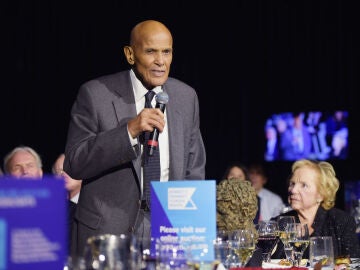
Singer, actor and civil rights activist Harry Belafonte, who in the 1950s broke down racial barriers in the United States, He passed away this Tuesday at the age of 96. at his home in New York, his representative Ken Sunshine has reported to local media.
He was born on March 1, 1927 in the New York neighborhood of Harlem (United States). Son of a humble family, He spent his childhood with his grandparents in Kingstown (Jamaica) and in 1940 he returned to New York where, to help the family finances, he worked as a shoe shiner while completing his studies at George Washington High School. At the age of 17 he enlisted in the Navy, where he remained for a year and a half.
Then, already determined to be an actor, he enrolled in courses at the American Negro Theater, and then went to the Dramatic Workshop acting school, where he was known among his peers as “the colored Marlon Brando.” He began his career as a stage actor until, thanks to a friend of his, he managed to sing at a venue owned by promoter Monty Kaye. His contract was extended for 22 weeksgiven the good reception it received.
creativity and music
After this first step as a singer, Belafonte, who was already beginning to be distinguished by his to interpret the African-American rhythms learned in Jamaica, he toured for two years, in which he performed in major theaters in the United States. After this time, she returned to the Vanguard, one of the best venues in the Greenwich Village neighborhood of New York, where her definitive consecration took place.
Four months later, he signed a ten-year contract with the RCA Victor label, and his records began to sell in the hundreds of thousands. In the America of racial segregation, Belafonte became a figure who transcended barriers and in the musical field he was a star with great impact.
He made Caribbean music fashionable con songs like “Day-O (The Banana Boat Song)” and “Jamaica Farewell”, which were part of his album “Calypso”, which shortly after its release reached number 1 on the Billboard chart in 1956 and remained first for 31 weeks. At the same time, she worked as the leading figure in the variety show “Almanac” on Broadway.
A successful jump to Hollywood
From there he made the leap to Hollywood, where he filmed, along with Dorothy Dandridge, the film “Carmen Jones” (1954), a version of Bizet’s opera “Carmen” with A cast made up of African-Americans. Three years later he starred in the film, “Island in the Sun.” After her came: “The World, the Flesh and the Devil” (1959), “Odds Against Tomorrow” (1959), “The Angel Levine” (1970), “Buck and The Preacher” (1972) and “Uptown Saturday Night “(1974).
From the beginning of his career, Belafonte alternated the song, the cinema, the theater and television. He took part in numerous television shows and received numerous awards. In fact, he is one of the few people who have won an Emmy, a Grammy, an Oscar and a Tony, which in the US are known as EGOT winners. Thanks to the income obtained in the world of entertainment, he launched various businesses, including a chain of shops and various entertainment agencies.
A tireless activist
In addition, he was a producer of tapes such as “Beat Street” (1984), based on the rhythm of breakdance. Apart from his professional career, Belafonte distinguished himself by his activism in favor of human rights, especially those of African-Americans. In fact, he got personally involved and funded the civil rights movement, was a personal friend of the Reverend Martin Luther King and participated in the historic March on Washington in 1963, the one with the famous “I have a dream” speech.
He also gained support for the cause of famous Hollywood stars such as Paul Newman and Marlon Brando, and was appointed by United States President John F. Kennedy (1961-1963) as cultural adviser to the newly created Peace Corps. Likewise, Belafonte founded a production company with his friend, actor Sidney Poitier, to open the doors of cinema to black actors and technicians.
Appointed UNICEF Goodwill Ambassador in 1987, in June 1988 he took part in the macro-concert “Nelson Mandela. Freedom at 70”, which took place at London’s Wembley Stadium on the occasion of the imprisoned South African leader’s 70th birthday. In November of that same year, he toured to protest against the policy of racial segregation in South Africa and was received by the then Pope, John Paul II.
In 1989 he was distinguished with the Kennedy Center Honor Award. He was part of the cast of actors in “The Player” (1992) and “Ready to wear” (1994), both Robert Altman films. In 1995 he starred with John Travolta in “White Man’s Burden,” set in an American city where power, the best jobs, and homes belong to African-Americans, while whites live in the suburbs and slums; and “Kansas City” (1996), also by Robert Altman, a film about mafia, crimes, racism and political struggle.
In 2011 the Berlinale premiered a documentary about the actor entitled “Sing your song”, directed by Susanne Rostock, and in 2014 the Hollywood Academy awarded him the Honorary Oscar. His last intervention in the cinema was in “BlacKkKlansman” (2018) by Spike Lee. belafonte married three times and was the father of four children, including actress Shari Belafonte, popular for her work on the television series ‘Hotel’.
Source: Lasexta
Bruce is a talented author and journalist with a passion for entertainment . He currently works as a writer at the 247 News Agency, where he has established himself as a respected voice in the industry.












